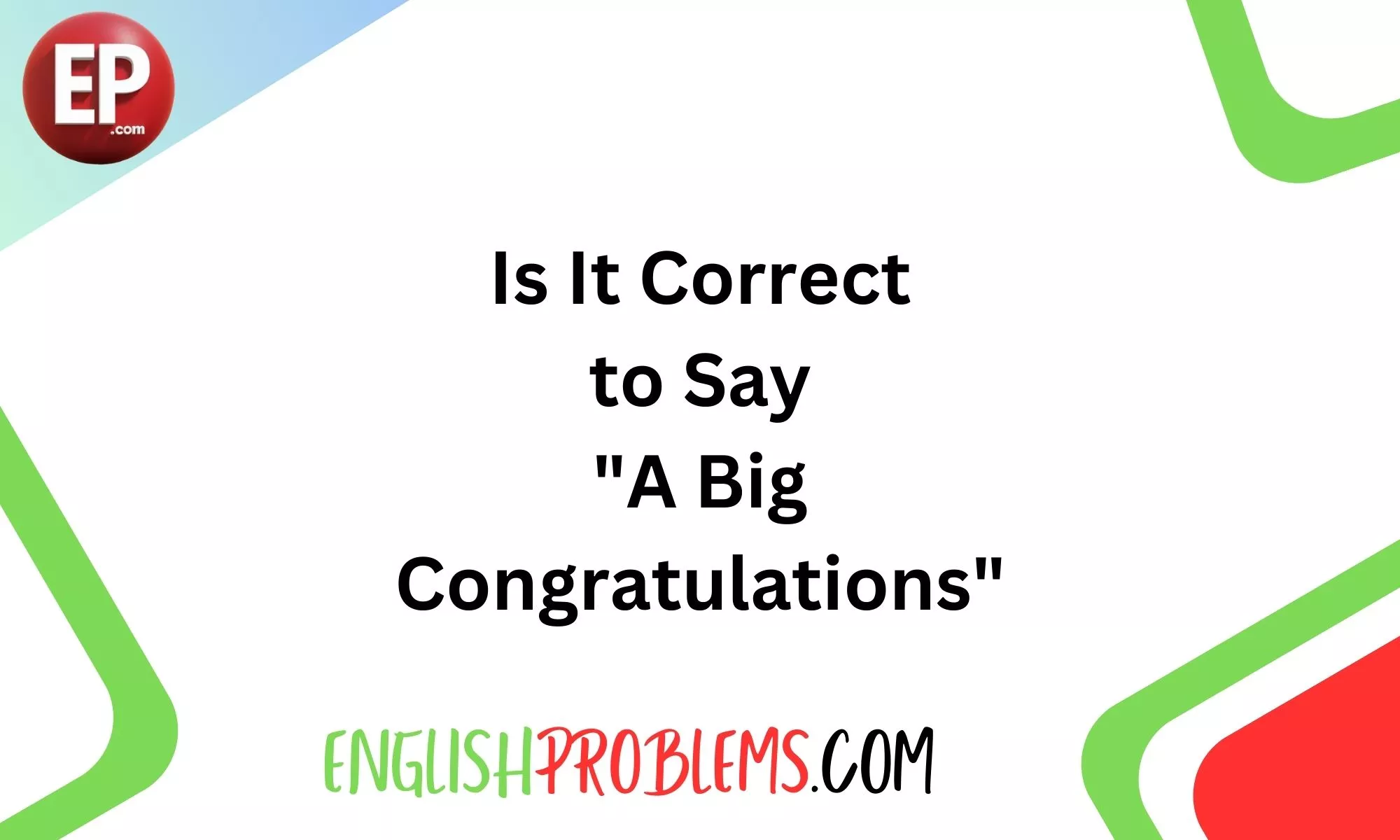The phrase “a big congratulations” frequently appears in conversations and written communication. However, its correctness and usage often spark debate. You might have heard it in casual settings or seen it on social media, but is it grammatically accurate?
This article delves into the structure of this phrase, explores common misuses, and provides alternatives to ensure your congratulations are expressed correctly and effectively.
Understanding the Phrase’s Structure
Breakdown of the Phrase
The term “congratulations” is a noun used to express praise for someone’s achievement. In most cases, it stands alone or is accompanied by a prepositional phrase, such as “on your promotion.” The word “big” is an adjective meant to emphasize the size or magnitude of something. Combining “big” with “congratulations” creates a phrase that can sound awkward or incorrect because “congratulations” is inherently a broad and encompassing term.
Analyzing Common Misunderstandings
The phrase “a big congratulations” often leads to confusion. The adjective “big” might seem redundant because congratulations already implies a significant recognition. For instance, saying “Congratulations on your achievement” is both concise and clear, while “a big congratulations” can feel excessive or misplaced.
Common Misuses in Everyday Language
Examples from Social Media and Casual Speech
In the digital age, phrases like “a big congratulations” frequently appear on social media. Here are some examples:
- “A big congratulations to John for winning the award!”
- “Sending a big congratulations to my friend on her new job!”
These instances reflect the informal and enthusiastic tone common on social media platforms. However, in formal communication, this phrasing might not be appropriate.
Misunderstandings and Their Implications
Using “a big congratulations” can lead to a lack of clarity and professionalism. It may confuse the reader or listener about the intended emphasis or tone. Correcting such misuses helps maintain a clear and professional communication style.
Professional and Social Contexts for “Congratulations”
Appropriate Use in Professional Settings
In professional settings, clarity and conciseness are crucial. Here’s how to offer congratulations effectively:
- Formal Emails: “Congratulations on your recent promotion. Your dedication and hard work are truly commendable.”
- Business Meetings: “I would like to extend my congratulations to the team for exceeding our quarterly targets.”
These examples show how to acknowledge achievements respectfully and professionally.
Social Contexts and Informal Usage
In social contexts, expressing enthusiasm is key. Use phrases like:
- “Congrats on your big win! You really earned it!”
- “I’m so happy for you and your new job! Congratulations!”
These phrases maintain a personal touch while celebrating achievements in a friendly manner.
Dissecting the Grammar Behind “A Big Congratulations”
Grammar Rules for Using Adjectives with Nouns
In English, adjectives describe or modify nouns. However, not all adjectives fit every noun. “Big” typically modifies physical size or magnitude, which doesn’t naturally apply to abstract nouns like “congratulations.”
Correct Phrasing Examples:
- “Congratulations on your achievement.”
- “Congratulations are in order for your outstanding performance.”
These examples use “congratulations” correctly without unnecessary adjectives.
Alternative Phrasing and Correct Forms
Instead of “a big congratulations,” consider these alternatives:
- “Heartfelt congratulations on your success.”
- “Warm congratulations on your recent accomplishment.”
These variations effectively convey enthusiasm without grammatical awkwardness.
The Meaning and Importance of “Congratulations”
The Significance of Congratulating Others
“Congratulations” serves as a powerful form of recognition and encouragement. It acknowledges someone’s effort and success, which can boost morale and strengthen relationships. Properly expressing congratulations shows respect and appreciation for the recipient’s hard work.
Cultural and Contextual Nuances
The use and importance of “congratulations” can vary by culture. In some cultures, formal and elaborate congratulations are expected, while others may prefer more understated expressions. Understanding these nuances helps ensure your congratulations are received positively.
The Role of “Big” in Emphasizing Achievements
When “Big” is Appropriate
The adjective “big” can emphasize significant achievements, but it needs to be used judiciously. For example, “a big achievement” or “a big milestone” makes sense because it directly describes the magnitude of the accomplishment.
Alternative Ways to Emphasize Achievements
Effective ways to highlight achievements include:
- Using Specific Language: “Congratulations on winning the national award.”
- Descriptive Phrases: “This is a remarkable achievement deserving of recognition.”
These methods emphasize the importance of the accomplishment without unnecessary adjectives.
Variations of Congratulations in American English
Common Alternatives to “Congratulations”
Here are some widely used alternatives:
- “Well done!”
- “Kudos!”
- “Hats off to you!”
Each variation can suit different contexts, from formal to casual.
Regional Differences and Preferences
Regional variations in American English can affect how congratulations are expressed. For example:
- Northeast: “Congratulations on your promotion!”
- South: “Y’all did great! Congrats!”
Understanding regional preferences can help tailor your message appropriately.
Creative Alternatives to “A Big Congratulations”
Phrasing Alternatives for Different Situations
Depending on the context, consider these alternatives:
- Formal Context: “Please accept my sincere congratulations on your recent success.”
- Informal Context: “Way to go! You did an amazing job!”
Examples and Use Cases
Formal Use Case:
“Congratulations on the successful completion of your project. Your hard work has paid off, and your dedication is truly inspiring.”
Informal Use Case:
“Congrats on acing your exam! You crushed it!”
These examples demonstrate how to adapt your congratulatory message to fit various contexts.
Conclusion: Mastering the Art of Congratulations
In summary, while “a big congratulations” is commonly used, it is not always the most accurate or effective way to express praise. Understanding the correct usage of “congratulations” and exploring alternative phrases can enhance your communication. Whether in professional or social settings, using precise and thoughtful language ensures your congratulations are well-received and impactful.
For more insights on effective communication and language usage, check out resources like Merriam-Webster and Grammarly.

Justin Taylor is an expert in simplifying the intricacies of English for learners of all levels. His clear and concise writing style, combined with his deep understanding of linguistic nuances, makes him a go-to source for anyone looking to improve their language skills. Justin’s engaging content ensures that learning English is both enjoyable and effective.










